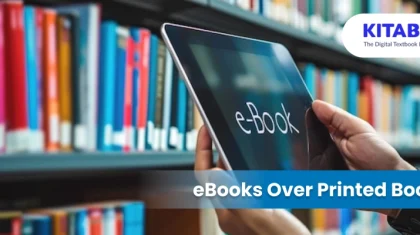
Creating eBooks in Digital Format: Interactive and Engaging
Summarize this blog with your favorite AI:
An eBook is a digital asset that has evolved from PDF formats to online, interactive, fixed, or reflowable content. Whether you are curating content for the education industry or the business arena, creating an interactive and enriched eBook can take your reader engagement to the highest level of reader experience today. 93% of marketers acknowledge that interactive content is a solid resource for audience engagement.
Publishers are capitalizing on eBooks to effectively connect with their audience. Considering the demands of the content-creating and content-consuming segments, eBook revenues are expected to reach $91.98 billion by the end of 2024, marking a 1.58% growth in annual CAGR. Digital textbook platforms like KITABOO aim to offer interactive eBooks that provide a more immersive experience and incorporate strategies for creating one comprehensively.
Table of Contents
I. Why Create Interactive eBooks?
II. How are Interactive eBooks Different from Traditional eBooks?
III. Types of Interactive eBooks:
IV. How to Craft an Interactive eBook: A Step-by-Step Process
Why Create Interactive eBooks?
eBooks are a great source of income for publishers and the best tool for readers to find relevant information. They are simple to create and publish, and your audience, irrespective of geographical location, can effortlessly access your eBooks.
Interactive eBooks offer a captivating reading experience with their exclusive features of portability, accessibility, and shareability. They have a range of rich elements within, allowing the audience to engage directly with your content. Interactive eBooks are not just about text and images, they also encompass infographics, hyperlinks, annotations, graphics, audio files, videos, quizzes, widgets, 3D graphics, animations, and much more.
Modern learning and digital textbook platforms use advanced formats like ePUB3 to create interactive eBooks. This enables publishers to interact with their audience in innovative ways. You can offer rich multimedia elements and immersive experiences, ask questions, provide answers, and even ask for feedback!
How are Interactive eBooks Different from a Traditional eBook?
Interactive eBooks grab the reader’s attention, drive higher engagement, offer rich learning experiences, and provide high-quality content that attracts and converts leads.
Let us look at some key features that make interactive eBooks better than traditional eBooks:
- Interactive eBooks offer direct interaction with your audience. Readers can engage with the content using various high-end tools.
- These eBooks can strengthen your brand as a publisher or content creator and provide you with immense opportunities to monetize your content.
- Interactive eBooks provide an excellent opportunity to initiate conversations with your audience, build trust, and encourage greater engagement with your brand.
- Emerging technologies like Augmented and Virtual Reality are integrated into eBooks
- eBook content is easily updated with minimal effort. While traditional eBooks are often limited to passive reading experiences, interactive eBooks provide more attractive and exciting user participation that eventually enhances lead retention.
- Interactive eBook content can be accessed across multiple devices, ensuring users can access the content with or without internet connectivity.
- Interactive eBooks offer a more cost-effective solution that can also be used for training, onboarding, and marketing purposes. Businesses can use such eBooks to enhance their brand presence and marketing efforts.
Types of Interactive eBooks:
You can create various kinds of interactive eBooks for your readers. Some of the most popular categories are:
- Interactive eBook with Chapter Ratings and Built-in calls-to-action.
- An easy Interactive eBook with images, tables, and shareable icons can also be converted into a PDF version.
- Simple interactive eBook with short quiz questions at the end of each chapter to test readers’ comprehension.
- Image-focused interactive eBook that enhances topic exploration with elegant animations and highlighting points.
How to Craft an Interactive eBook: A Step-by-Step Process
Here is a step-by-step guide to creating interactive eBooks for your readers:
Step 1: Draft Your Content
The first step is to assemble your content before you begin with the eBook creation process. Here are some integral things to consider:
- Ensure your content is engaging, and define your audience according to demands, demographics, interests, and needs.
- Choose your topic and create an outline for your eBook.
- Organize your ideas into appropriate sections, and plan informative content for each section of your eBook.
- Use clear language and incorporate relevant keywords to improve the discoverability of your eBook.
- Review your draft multiple times to correct any flaws or inconsistencies.
Step 2: Select the Best Software
It is feasible for content creators to publish an interactive eBook on their own. However, it’s essential to acknowledge the technical complexities involved in the process. eBook designing, formatting, conversion to various formats, and determining layouts can be quite a hassle for content creators. It is best to let the professionals and experts do what they are best at.
You can contact leading services like KITABOO to create interactive eBooks with a fixed layout or reflowable design. The experts will help you include animations, videos, graphs, GIFs, assessments, and more, and offer distinct advantages.
Other reasons why you must trust the best software to create interactive eBooks are:
- Access to specialized writing skills by experienced content writers and proofreaders. This ensures the creation of engaging content.
- The expertise of domain-experienced professionals who can guide you through every stage of the eBook development process.
- With expert assistance, creating a highly engaging interactive eBook results in quicker turnaround times.
- Digital content platforms offer DRM security for eBooks that protects the revenue of publishers and safeguards the content against theft and piracy.
- It is a cost-effective solution compared to hiring in-house resources.
- Interactive eBook services can help you transform traditional books into digital formats and convert titles into multiple languages, allowing you to reach a global audience.
- Such services ensure approximately 100% accuracy in the final eBook, and publishers can leverage error-free content adhering to the highest quality standards.
Step 3: Add Features to Create Interactive eBooks
Here are some key features you must add to create an interactive eBook:
- Create an interactive table of contents that allows readers to surf through different sections of interest.
- Incorporate voiceovers and quizzes at the end of chapters, and embed videos into your eBook
- Enrich your eBook content with hyperlinks or external sources
- Integrate animated elements, maps, charts, diagrams, and graphs to simplify complex topics and enhance the visual appeal of your eBook.
- Increase conversions by placing call-to-action buttons throughout your eBook.
Step 4: Share Your Interactive eBook
After creating your interactive eBook, follow these tips to share, distribute, and market your eBook:
- Identify the platforms or channels where you’ll distribute your eBook.
- Convert your eBook into compatible file formats and ensure it is appropriate for each distribution channel.
- Utilize your social media platforms to promote your eBook, and use email marketing to reach your existing audience and subscribers.
- Partner with influencers or collaborators to expand your eBook’s reach.
- Offer limited-time promotions or discounts on your eBook.
- Encourage readers who have downloaded your eBook to leave reviews and testimonials.
- Track the performance of your eBook distribution and marketing efforts using analytics tools to evaluate the success of your eBook distribution and marketing strategies.
- Identify areas for improvement based on feedback and performance, and optimize results.
Conclusion
Interactive eBooks are significant learning and marketing tools, that enhance lead and revenue generation through engaging content. While eBooks can serve various purposes, organizations across industries leverage educational, informative, and engaging content through interactive eBooks to generate leads at the top of the funnel. Transform your existing content into interactive digital formats today and bridge educational content with product awareness.
If you don’t know where or how to start, you can rely on top-ranking digital textbook platform services like KITABOO. This cloud-based and AI-enriched platform helps you create interactive eBooks for learning, training, documentation, or business purposes.
Also Check:
Discover how a mobile-first training platform can help your organization.
KITABOO is a cloud-based platform to create, deliver & track mobile-first interactive training content.



